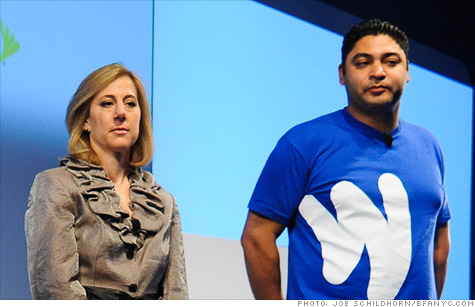
Former PayPal employees Stephanie Tilenius and Osama Bedier, seen here at this week's Google Wallet launch, are at the center of a lawsuit alleging trade-secret theft.
NEW YORK (CNNMoney) -- PayPal and its parent company eBay sued Google this week. The company claims that two of its former top executives violated their contracts by sharing confidential information with Google and by negotiating with Google despite a clear conflict of interest.
California courts are famously unfriendly to employee non-compete agreements -- which means eBay will have a hard fight to prove its case. Here's a timeline of what eBay says happened, based on the details provided in its lawsuit.
March 12, 2001: Stephanie Tilenius joins eBay's staff and signs the company's non-disclosure agreement (NDA), agreeing not to solicit any eBay (EBAY, Fortune 500) employees for one year after leaving the company and not to disclose confidential eBay information.
Nov. 13, 2002: Osama Bedier begins work at PayPal and signs an NDA. He eventually becomes a vice president in charge of bringing mobile payment technology and services to retailers.
January 2004: Tilenius becomes vice president of PayPal merchant services.
2006: Google (GOOG, Fortune 500) launches PayPal competitor Google Checkout. PayPal researches the rival and briefs Bedier on its weaknesses.
2008: EBay begins negotiations with Google to make PayPal a payment option for mobile application purchases on the Android Market.
Oct. 16, 2009: Tilenius resigns as eBay's vice president of North America and global products, and she reaffirms the NDA she signed in 2001. Though she stops working for eBay on a full time basis, she stays on as a consultant for the company.
2010: Bedier becomes the senior PayPal executive in the negotiations with Google.
Feb. 16, 2010: Google hires Tilenius as vice president of electronic commerce. She is still consulting for eBay at the time.
March 3, 2010: Tilenius stops consulting for eBay.
June 2010: Google names Tilenius head of its new commerce and payments division.
July 15, 2010: Tilenius begins attempting to lure Bedier away from PayPal to work for her at Google. She writes a Facebook message to Bedier that says "I heard from a little birdie that you might be open to bigger and better challenges, I have a HUGE opportunity for you, would love to chat if you are interested."
Aug. 25, 2010: Tilenius asks Bedier in a Facebook message if he wants to speak with Google Senior Vice President Jeff Huber.
Aug. 27, 2010: Tilenius makes the connection between Bedier and Huber in an e-mail, saying "You two should talk about the opportunity at Google."
September 2010: Bedier begins interview process with Google as he continues to negotiate with Google on PayPal's behalf to make PayPal a mobile payments option on the Android Market. EBay says Bedier never informed the company of this conflict of interest.
Oct. 21, 2010: Bedier culminates interview process with Google by meeting with top Google executives, including then-President Larry Page.
Oct. 26, 2010: PayPal and Google finalize the Android Market deal. Google, however, declines to sign the deal.
Oct. 28, 2010: In his PayPal capacity, Bedier meets with Android head Andy Rubin about Google's strategic shift.
Oct. 31, 2010: Google offers Bedier a job.
Nov. 1, 2010: Bedier informs PayPal of his job offer. PayPal tells Bedier that he would be in violation of his contract if he accepted Google's offer.
Nov. 2, 2010: Bedier meets again with Rubin to discuss how he could help Google compete against PayPal.
Nov. 12, 2010: Google sends Bedier a formal offer of employment, but he does not immediately accept it.
Nov. 19, 2010: Bedier asks Tilenius whether he could bring PayPal co-workers over to Google with him in an e-mail saying, "If folks want to join me on day one -- how possible is this?"
Nov. 27, 2010: Tilenius sends Bedier a text message saying "By next week there will be more information I can share and you will see how the role at Google could be expanded considerably." Page speaks with Bedier about expanding his proposed role at Google, and Bedier formally accepts the job offer.
Dec. 2, 2010: Bedier changes his mind about Google, and informs PayPal of his decision to remain at the company rather than accepting Google's offer.
Dec. 3, 2010: Tilenius texts Bedier, asking if more money would help get him to change his mind.
January 2011: Bedier transfers PayPal's mobile payment strategy to his personal, non-PayPal computer.
Jan. 24, 2011: Bedier leaves PayPal for Google. PayPal says Bedier and Google have "misappropriated PayPal trade secrets by disclosing them within Google and to major retailers."
February 2011: Google inks a revised agreement with PayPal, but Google delays telling PayPal that it signed the agreement.
April 7, 2011: Google reneges on PayPal agreement, informing the company that it plans on building a competing product. Google recruits Usman Abbasi, a high-ranking PayPal engineer involved with mobile payments.
May 26, 2011: Google launches its new Google Wallet mobile-payment offering. EBay files its lawsuit against Google, Tilenius and Bedier in California's state court in Santa Clara.
Google issued a statement Friday saying it will fight the suit.
"Silicon Valley was built on the ability of individuals to use their knowledge and expertise to seek better employment opportunities, an idea recognized by both California law and public policy," a spokesman wrote in an e-mail to CNNMoney. "We respect trade secrets, and will defend ourselves against these claims." ![]()